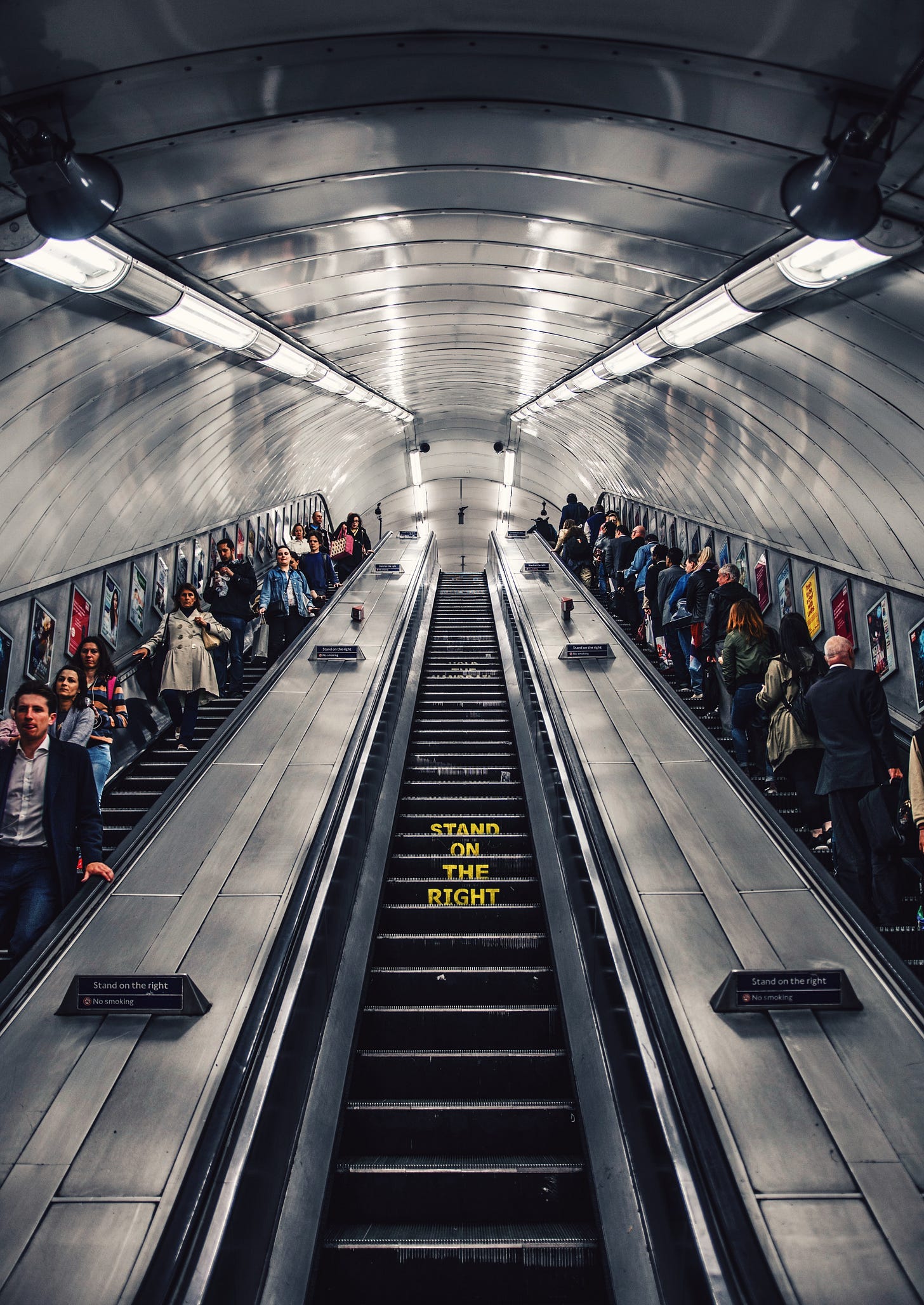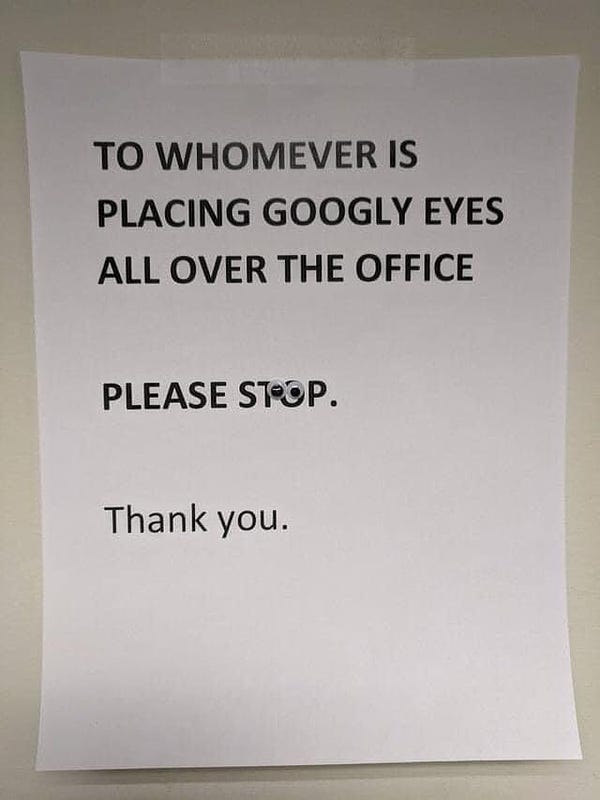Rediscovering our workplace identity
ALSO: how installing Slack has caused trouble inside Apple's culture
How many times have you been back to the office? I was on the Tube on Tuesday morning at 8am and the carriage was rammed with (mainly mask-wearing) people. Travel at any other time of day and there’s barely a mask to be seen. We’ve definitely entered a different stage of the pandemic even if the long anticipated return to the office hasn’t quite gone how we imagined it a few months ago.
One of the things that has become clear is that we’ve got into a rut with some of the ways we’re working that might end up being regretted by some firms. For example one surprising upside of remote work that many firms saw last year has disappeared a little. When we first went into lockdown - certainly in the UK - many bosses saw it as a way to break down barriers and have meetings with more junior parts of the business that they didn’t previously to engage with. Dialling in to calls with teams of new recruits, or in other countries or cities in a way that made those teams feel seen. But as the novelty of remote working has dissipated these adaptations seem to have slipped. Those who felt the laser beam of management attention no longer feel the radiant support of their bosses in the same way. Three or four firms have told me that internal pulse scores have dipped - with burnout also featuring prominently in the numbers.
Those who have been in to the office have observed something else. One manager told me that a combination of social awkwardness and unfamiliarity meant that their visits to the office have been characterised by realising how few colleagues they now recognise. Yes - they know the people they do calls with very well but beyond that there’s a lot of people who are on mass Zooms but don’t ring a bell at all in person.
As the Reddit thread (in the links below) demonstrates right now there’s a strong feeling amongst a whole range of workers that they need to know the reason why they’re being brought into the office for three-days-a-week. The first time they came in was a novelty, by the second time the excitement of being out of loungewear was gone and sitting in an empty office doing video calls didn’t make much sense. ‘I could do this at home’ is a recurrent comment. (BTW: if you’re interested in this Leesman have published a guide to answering it this week)
And so enters the importance of creating something bigger than individuals and their allocated jobs - building a meaningful culture . The business-oriented reason why this matters is that a more motivated workforce is more productive and more inventive. From the average worker’s point of view having a sense of personal connection at work is personally enriching. Happiness and personal wellbeing are measurably higher when people have a friend at work - we have one lifetime and we’re losing less of it to boredom when we feel inspired by the people we’re working with.
(Of course some of us might decide that all of that is a concession in itself, below Charlie Warzel says the idea of a career is optional if we want to live a meaningful life, ‘I no longer aspire to have a career’ says one online commentator).
Over the last few years business gurus have tried to suggest that the answer to this is firms creating a sense of purpose, answering the why of work. It’s a lovely idea, the people who espouse it often recommend that you read the truly remarkable books of Primo Levi. Those with a sense of purpose survived Auschwitz they tell us. And it’s such a vivid, inarguable point that we forget that in our jobs we’re not trying to escape the holocaust, we’re trying to market a substandard alternative to the Twix (no offence to Drifters, just choosing a job at random).
Over time if you’ve tried to get teams to be inspired by purpose you might have noticed it has mixed results. Yes, it works for the All Blacks, but it doesn’t translate to our more everyday employment. I was fortunate this week to talk to two leading psychologists who have written about themes of identity, specifically group (or social) identity. Jay van Bavel and Dominic Packer are the authors of a new book called The Power of Us. The book explores the evidence that often the strongest bonds we form are when we feel a shared sense of identity with those around us. Whether that is home supporters at football, pop fans heading to the Hoopla festival, or (yes) furious anti-maskers protesting in your town centre. Identity (and identity politics) have been at the forefront of discourse over the last few years but it’s served to distract us from the positive benefits of a sense of shared identity. The reason why politicians exploit identity is because it is so remarkably powerful once activated.
As we head back to the office we might wonder why things feel different. The best firms won’t keep re-opening discussions about how many days in the office or changing the rules, they will be focussed on understanding what they can do to forge a collective identity amongst colleagues. Irrespective of where work is done, the best firms will ensure workers feel part of something that matters, with people they care about.
If you’re interested in themes of identity my conversation with the authors of The Power of Us makes up today’s podcast. If you’re interested in this there’s more coming over the next few weeks.
One for those interested in human psychology: how understanding our group identity is the secret to creating the next generation of good workplace culture. Apple / Spotify / Acast
Implementing Slack has caused havoc with Apple’s culture - firstly it allowed workers to self organise around their identity intersections (women’s groups etc), then workers started trying to survey each other to see how much colleagues were earning. The end result is that Apple have found their employees actively organising and pushing back against the PR lines that leaders have been taking (‘you say there’s no gender paygap, prove it…’) This is a brilliant listen that covers the whole story
I enjoyed this Reddit UK thread about the return to work - lots of people talking about mandated returns to their office and many workers quitting in response. Includes lots of people asking why they need to be back in the office if work is going better (as we’ve said above answering that question is the main job for office advocates right now - what is the personal value-add of the office?)
Nike did something strange here - they gave the management at head office a week off to decompress - but lots of people told me it wasn’t company-wide
In the US firms are starting to wrestle the challenges of how to return to the office, one airline has told unvaccinated workers they will have to pay some of the $50,000 it costs them to deal with a workplace infection by paying $200 extra healthcare pre-month
Fully remote working seems to be a rising option for UK workers - as I write this there are over 25,000 remote jobs posted on LinkedIn
In 2019 Derek Thompson in The Atlantic wrote about how careers were an invention of the late twentieth century (calling it ‘workism’), now Charlie Warzel suggests there’s a growing sense of workers rejecting the need to ‘make progress in their career’
Digital snoopware is becoming a norm in a number of US firms
Photo by Tom Parsons on Unsplash










